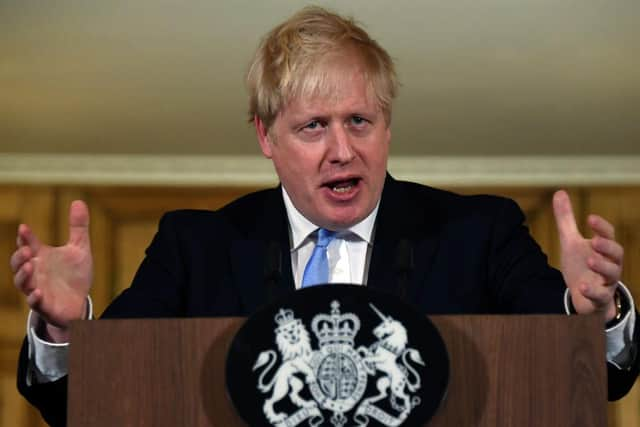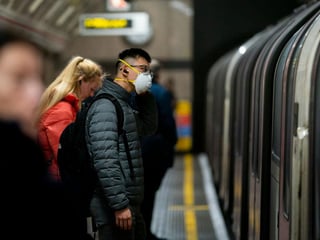Cobra meeting: when is today’s government meeting about coronavirus - and what will be discussed
The first broadcast, scheduled for the afternoon of Monday 16 March, will follow the conclusion of the latest meeting of Cobra.
‘Cobra’ stands for “Cabinet Office Briefing Room A” and refers to the emergency council which is formed when a crisis arises which will call for various different departments to work in tandem.
Advertisement
Hide AdAdvertisement
Hide AdThey meet in the Cabinet Office's briefing rooms (usually room A), hence the name.


The idea is to convene all the relevant parties at once to make rapid, effective action possible. In America, the Situation Room provides roughly the same function.
Having originally been formed in response to the miner's strike in 1972, past COBRA meetings have also been called to deal with issues like the fire-fighters' strike, terrorist attacks across Europe and the US, and the Novichok poisoning case.
When is the next COBRA meeting, and what will be discussed?
At the time of writing, the next Cobra meeting is scheduled to take place on the afternoon of Monday 16 March.
It is expected that the Prime Minister will want to discuss implementing further measures to stop the spread of the virus, including protections for the elderly, a ban on mass gatherings and mandatory home isolation for vulnerable groups.
The PM is also expected to call on British manufacturers such as the Unipart Group to support the production of essential medical equipment for the NHS.
He will also speak with all G7 leaders including US President Donald Trump and German Chancellor Angela Merkel to discuss the global response to the pandemic.
What happened at the last Cobra meeting?
Following last week’s Cobra meeting, it was announced that the UK was to switch from “contain” to “delay”; a change of approach in how the country deals with he pandemic.
Advertisement
Hide AdAdvertisement
Hide AdFrom Friday (13 March), anyone with symptoms indicative of coronavirus was instructed to self-isolate for seven days.
The move came a day after the World Health Organisation (WHO) announced that the novel strain of coronavirus was a global pandemic.
What did Nicola Sturgeon say?
Speaking following the emergency meeting, the First Minister said: "The decision has been taken that we have now moved from a contain phase into the delay phase where the objective is to seek to slow down the spread of the virus, to reduce the numbers who will be infected at the peak, the number infected at any one time."
She said unless symptoms do not clear up within a few days, or anyone infected is deteriorating, they do not need to call their GP or NHS24.
She added there will not be routine tests on everyone who has coronavirus symptoms, but surveillance will continue.
Ms Sturgeon confirmed the Scottish Government has taken the decision to advise gatherings of more than 500 people be cancelled from the start of next week.
She said a clear definition will be provided, but the advice relates to gatherings that potentially have an impact on emergency services.
She told a press conference at the Scottish Government headquarters in Edinburgh she would not consider church services in that way, but football or rugby matches - due to their size and need for dedicated ambulance services - should be reconsidered.
Advertisement
Hide AdAdvertisement
Hide AdShe said: "Progressively, the next few weeks are going to have services under acute pressure. I feel an obligation to remove as many unnecessary burdens as I can."
Measures such as school closures and banning public gatherings, two major steps of the delay phase set out in the Government’s coronavirus action plan last week, may not yet be given the go ahead, but will come under consideration.
By delaying the spread of the disease until the warmer months it is hoped that the government can reduce the risk of overlapping with seasonal flu.
It would also buy time for the testing of drugs and the development of vaccines.
Coronavirus: the facts
What is coronavirus?
COVID-19 is a respiratory illness that can affect lungs and airways. It is caused by a virus called coronavirus.
What caused coronavirus?
The outbreak started in Wuhan in China in December 2019 and it is thought that the virus, like others of its kind, has come from animals.
How is it spread?
As this is such a new illness, experts still aren’t sure how it is spread. But.similar viruses are spread in cough droplets. Therefore covering your nose and mouth when sneezing and coughing, and disposing of used tissues straight away is advised. Viruses like coronavirus cannot live outside the body for very long.
What are the symptoms?
The NHS states that the symptoms are: a dry cough, high temperature and shortness of breath - but these symptoms do not necessarily mean you have the illness. Look out for flu-like symptoms, such as aches and pains, nasal congestion, runny nose and a sore throat. It’s important to remember that some people may become infected but won’t develop any symptoms or feel unwell.
What precautions can be taken?
Advertisement
Hide AdAdvertisement
Hide AdWashing your hands with soap and water thoroughly. The NHS also advises to cover your mouth and nose with a tissue or your sleeve (not your hands) when you cough or sneeze; put used tissues in the bin immediately and try to avoid close contact with people who are unwell. Also avoiding touching eyes, nose and mouth unless your hands are clean.
Should I avoid public places?
Most people who feel well can continue to go to work, school and public places and should only stay at home and self isolate if advised by a medical professional or the coronavirus service.
What should I do if I feel unwell?
Don’t go to your GP but instead call NHS 111 or look online at the coronavirus service that can tell you if you need medical help and what to do next.
When to call NHS 111NHS 111 should be used if you feel unwell with coronavirus symptoms, have been in a country with a high risk of coronavirus in the last 14 days or if you have been in close contact with someone with the virus.

